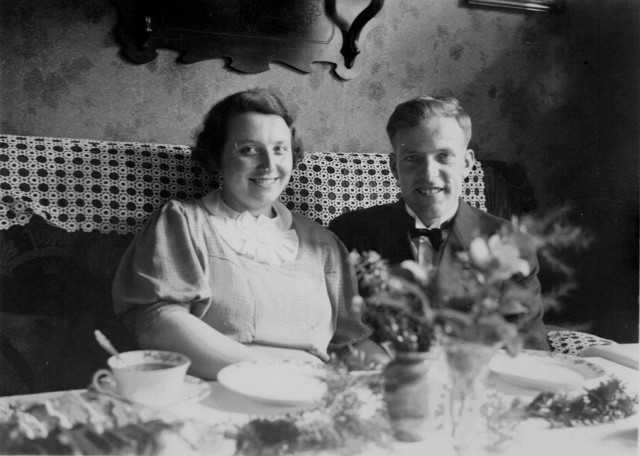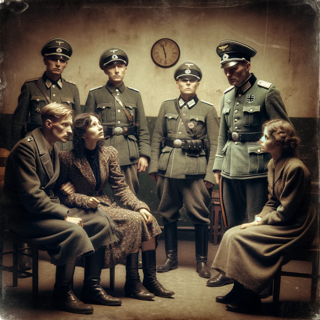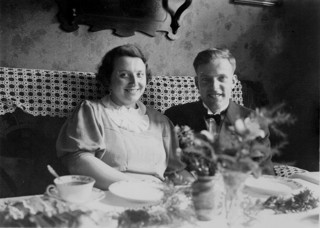January 2024
Uncover the riveting tales between The Spy and The Homemaker and The Electrician and The Seamstress, where personal family histories intertwine with the dramatic events of World War II, revealing a saga of bravery, espionage, and the indomitable human spirit. Dive into this gripping narrative that connects a daring intelligence officer's covert operations with the daily struggles of civilians in war-torn Germany, presenting a compelling story that's as much about historical intrigue as it is about the resilience of love and family through tumultuous times.
JOIN THE CONVERSATION
Do you believe there are lessons to be learned from history that we can apply to today’s world?
Having learned so much about world history from the 1920s to the 1940s; Do you find the rise of the Far Right in contemporary times terrifying?
Last updated 17 months ago
Will publish on 06/07/2026
Meeting My Dead Grandparents
By Monica Granlove

People often ask about the inspiration behind my Timeless Legacy novels. The Spy and The Homemaker emerged from my husband's deep dive into his family history, tracing it back to the 17th century. His research, in collaboration with Ancestry, the Swedish Historical Society, and historian Maria in Sweden, took years to compile. His grandfather, Axel Viggo Granholm, born in Argentina and raised in the U.S. and Sweden, was a decorated World War II intelligence officer and pilot, achieving the rank of Lieutenant Colonel.
Simultaneously, we explored the war-torn city of Kiel, uncovering the story of my German grandparents. Unfortunately, due to the extensive bombing (over 80%), finding records about their lives became a challenging task. Writing both the Arnold and Granholm stories immersed me in a time before television and computers, allowing me to feel the profound anxiety and uncertainty that characterized the era. I grew up with many family stories from the war and post-war period, which, along with extensive interviews, inspired The Electrician and The Seamstress.
The year 1942 was transformative for both our families. It was marked by Grandpa Axel's mission to photograph northern Germany. Fluent in Swedish and several other languages, he made multiple dangerous trips over northern Germany into Denmark and Sweden, working with the Danish resistance in sabotage, espionage, and propaganda.
In a twist of fate, Axel had to make an emergency landing in occupied Germany—on my family's farm. There, he met my grandparents, Bruno and Karla. Tragically, my great-grandparents, Therese and Otto, passed away shortly after Axel’s landing, their deaths wrapped in mystery.
The following short story from The Electrician and The Seamstress, narrated by my grandfather Bruno Arnold, sheds more light on the wartime challenges and the ever-present threat of the Gestapo:

The Nazis murdered my oldest son, Klaus, at the age of two because he was born with a disability and he didn't fit into the Nazi’s version of a pure society. Still reeling from Klaus’ death in November, we were just finishing dinner when there was a sharp knock on the apartment door. Karla looked at me from across our small dining table silently communicating how terrified she was . My chair screeched as I stood up then walked to our apartment door. I took a deep breath trying to calm my nerves then opened the door to find two SS officers. One was shorter than me with a mustache trimmed short like Der Führer’s. The other was tall and lanky. Both had the unmistakable sharp terrifying eyes.
I felt rather than saw Karla stand up and gather Rolf in her arms.
The Gestapo officers strolled in uninvited, looking around the room and sniffing the air. Their eyes were sharp and menacing as they looked for any infractions.
“Herr Arnold, we are here to investigate the death of your neighbor, Frau Bauer.”
I started thinking about which of my neighbors saw me loading the coffin in the back of the truck and exactly what the neighbor thought they saw. I knew the officers had already spoken to a neighbor who saw something, and their question was a test. One discrepancy and they would send us to a workcamp or shoot us, taking Rolf to be raised by a Nazi. My heart started racing.
I nodded, holding my breath, sure we were going to be shot right then.
“Who found the body?”
“Karla was bringing food to the old woman.” I motioned towards my wife. “When Frau Bauer didn't answer her door, Karla looked in and saw her dead.” I put my shaking hands in my pocket, thankful I wasn't smoking when they walked in where they could see my hands.
“Did you call the police or take it upon yourself to bury her?” The Gestapo Officer asked.
“I built her coffin and took her to be buried.”
“Frau Arnold,” he said as he turned to my wife. Karla tightened her grip on Rolf. “What did you make Frau Bauer for dinner?”
“Potatoes and cabbage.”
“Where is she buried?” he asked, turning back to me.
“I buried her just outside of Kiel in the Friedhof Osterfeld.”
“All right; let’s go visit her grave.”
I felt the heat of panic from the top of my head to my stomach. My heart started racing wildly as I tried to think of a way out or an excuse as to why there was no gravestone with her name on it.
Would there be a place where the dirt was disturbed enough it looked like a new burial? Surely, with all the bombings there would be a new grave. Maybe they would force me to dig it up.
Just then chaos broke out as we heard the sirens warning civilians to go to the bomb shelters. I heard the first of the RAF planes and then bombs started hitting the ground. One hit the building across the street. I started to grab Rolf then stopped, waiting for the two officers. Another bomb hit close by.
“We’re not done with this conversation. We will be back.”, The two Gestapo officers exclaimed with urgency.
I was surprised both officers took the time to salute me with a “Heil Hitler” since the bombs were being dropped all around. As soon as they left, I took Rolf from Karla and grabbed her hand heading for the basement. It was too late to go to the bomb shelter down the street. We just ran down the stairs in total darkness, stumbling, and ultimately forming a pile of bodies in the corner; clutching to each other for safety. Gripped by a fear that was all too familiar.
My husband and I frequently pondered the possibility that the photographs captured by Grandpa Axel in September might have been utilized to guide the RAF in selecting bombing targets over Kiel, ultimately impacting my grandparents in November 1942.
Regardless, no one could have predicted that the grandchildren of Axel, Virginia, Karla, and Bruno would have met and fallen in love.


